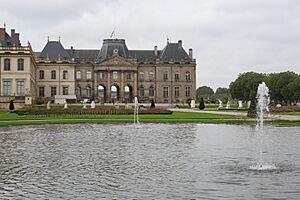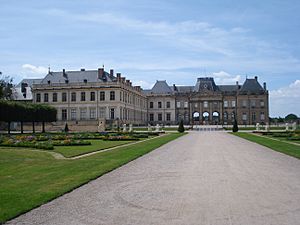Château de Lunéville facts for kids
The Château de Lunéville is a beautiful old palace in France. It used to be the home of the Dukes of Lorraine, who were like rulers of their own small country. Many people call it the "Versailles of Lorraine" because it looks a bit like the famous Palace of Versailles, but it's smaller. Today, it's not a home for dukes anymore. It's a museum, and it's being carefully fixed up and restored.
Contents
History of the Château de Lunéville
Building a Grand Palace
For a long time, there was a building on this spot, even back in the Middle Ages. But the rulers of Lorraine didn't have much money. So, they couldn't make it grander or more modern.
Duke Leopold I of Lorraine married Élisabeth Charlotte d'Orléans in 1698. She was a niece of Louis XIV of France, the king who was building the huge Palace of Versailles. The Duke and Duchess of Lorraine had a growing family. Duke Leopold decided he needed a new palace. This new palace would show how important he was as a ruler.
Changes in Ownership
Duke Leopold of Lorraine died in 1729. His son, Francis Stephen, became the new duke. Francis Stephen later married Empress Maria Theresa. She was a very powerful ruler. Because of this marriage, Francis Stephen spent most of his time in Austria with his large family.
After a war between France, Poland, and Austria, a peace agreement was made in 1735. This agreement was called the Treaty of Vienna. Under this treaty, Stanisław Leszczyński received Lorraine. He was the father-in-law of King Louis XV of France. Stanisław Leszczyński had lost his claim to the throne of Poland. As a trade-off, Francis Stephen was promised the Grand Duchy of Tuscany. He inherited Tuscany in 1737.
While Stanisław Leszczyński lived there, the palace was known as the Château Stanislas. Both Stanisław Leszczyński and his wife, Catherine Opalińska, died at the Château. Catherine died in 1747, and Stanisław died in 1766. After the Polish royals left, the Château was mostly forgotten.
Restoration and Future
The Château de Lunéville was officially made a French Historic Monument in 1901. This meant it was protected as an important historical site. Today, the palace is still being restored. Workers are carefully fixing up the building and its beautiful decorations. Soon, even more of its history will be ready for visitors to explore.
See also
 In Spanish: Palacio de Lunéville para niños
In Spanish: Palacio de Lunéville para niños
 | Laphonza Butler |
 | Daisy Bates |
 | Elizabeth Piper Ensley |




